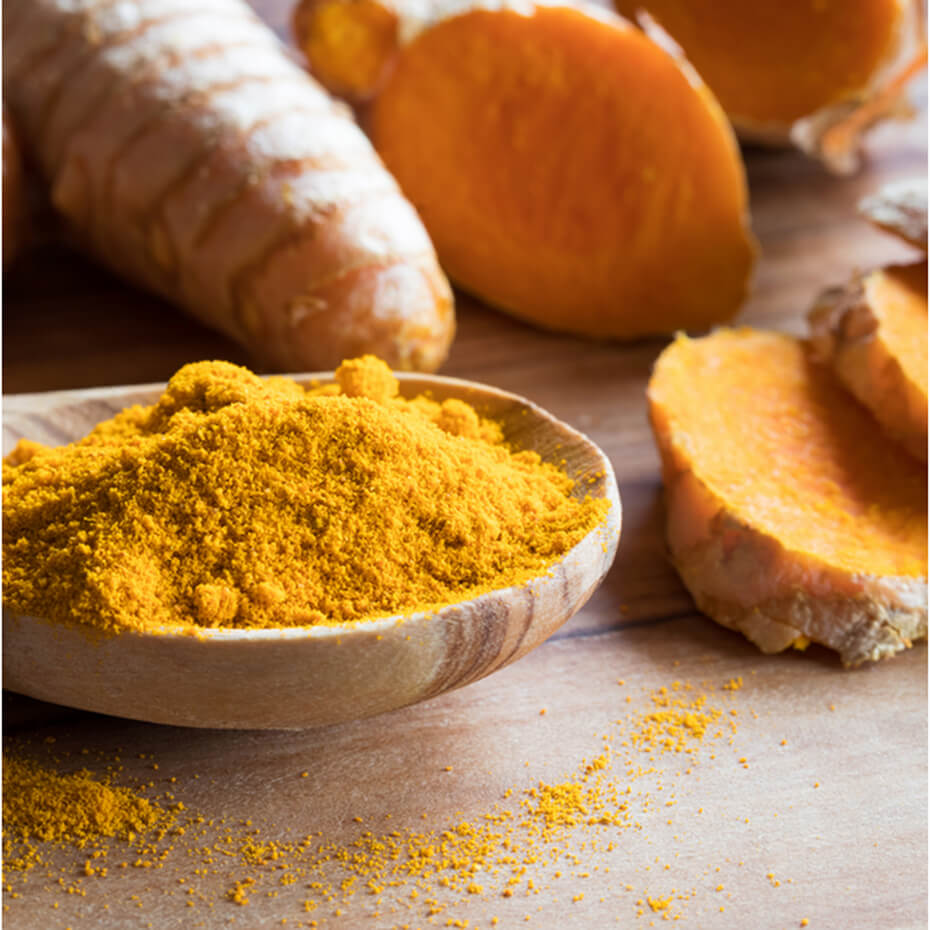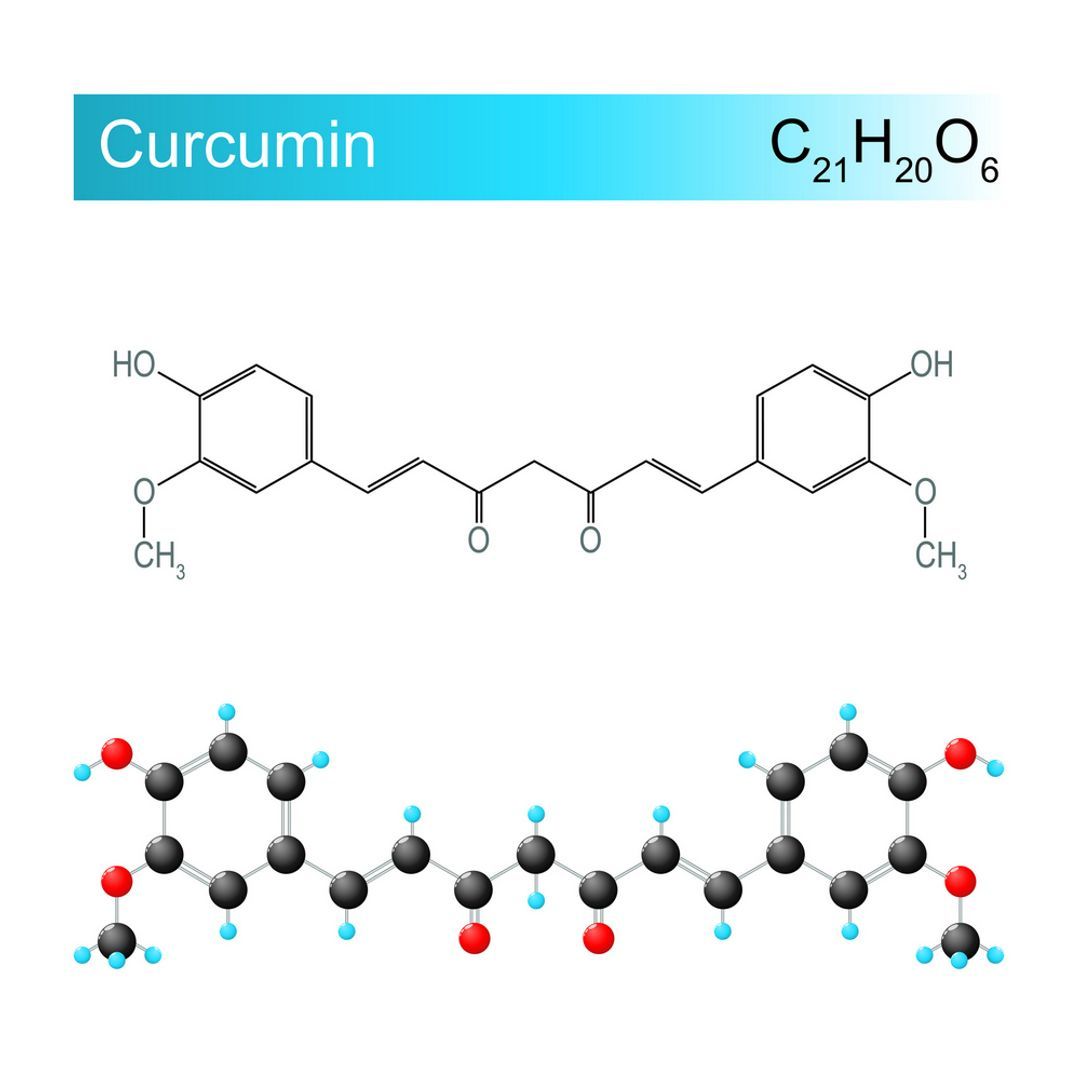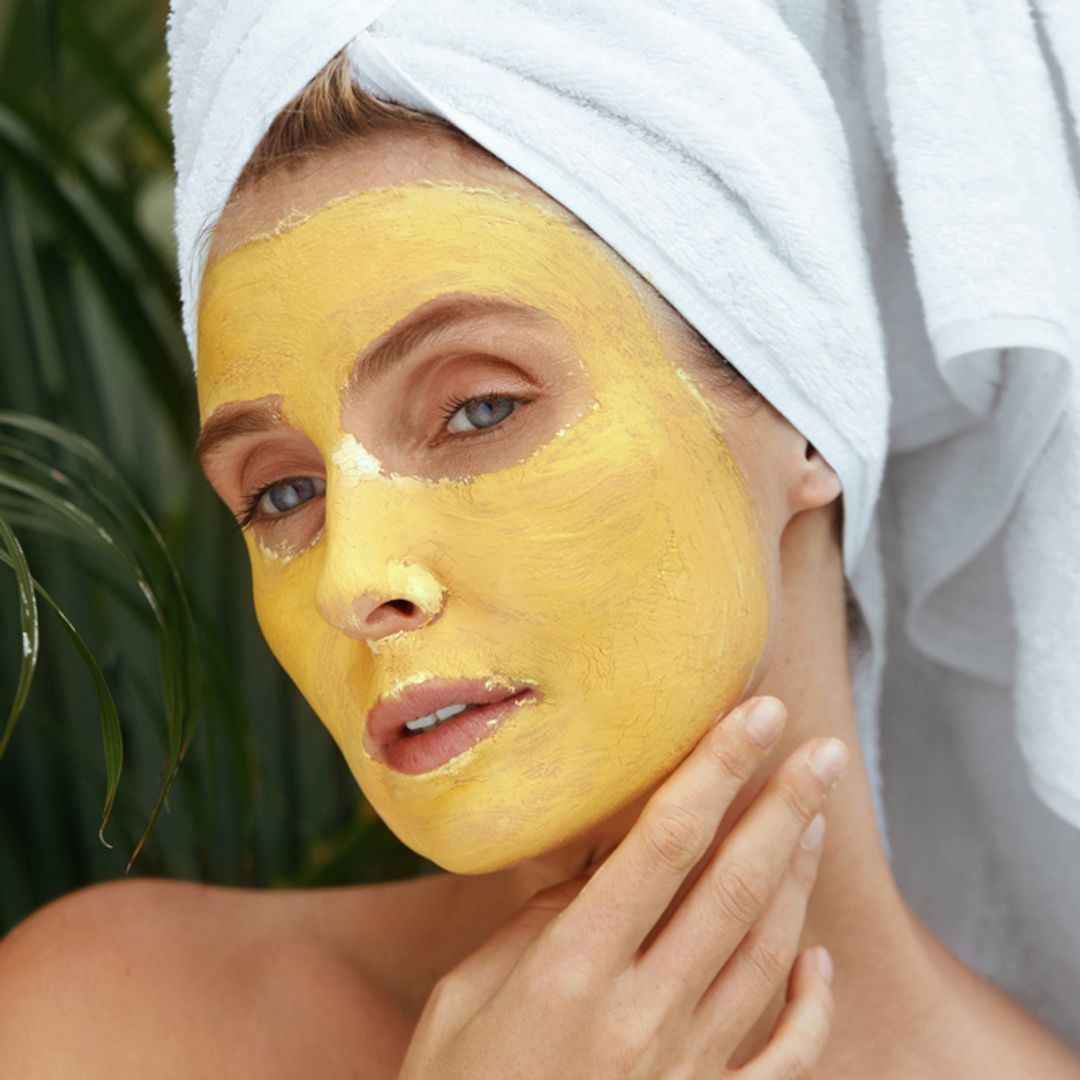Discover the Anti-Ageing Properties of Curcumin
Curcumin is showing promising signs of being a fantastic anti-ageing compound. Discover all curcumin has to offer and how you can add it to your wellness routine.

- Curcumin is seen as a valuable natural anti-ageing compound and could help support anti-ageing. For example, it could help improve energy levels, maintain telomeres, reduce senescent cells, lower oxidative stress and chronic inflammation, along with preventing glycation.
- Unfortunately, curcumin has poor solubility and absorption rates in its free form and not many of us like the idea of yellow staining. Advancements in micro-formulations and nano-formulations of curcumin have managed to improve absorption rates to allow for advantageous blood levels of the active forms of curcumin.
- Modern sources are being made into a broad range of products, supporting different age-related applications. Curcumin skincare products have become particularly popular with people now using face masks, cleansers, toners, spot treatments, serums, and creams all containing the active ingredient.
- Research into the safety of curcumin has shown that topical application has no known side effects. However, when ingested, some may experience gastrointestinal side effects like mild upset stomach and cramps.
Many consider turmeric to be the most legitimate of all the superfoods. This is because it has been around for centuries and has been extensively studied and researched to understand its true potential. Unlike other new superfoods which are being developed for the health food industry, turmeric is a simple spice that has been discovered to have many benefits to support an active lifestyle and ageing conditions.
The spice itself comes from ginger-like plants whose roots are collected, dried and made into a spice. It is a popular cooking spice in many Indian and Asian dishes and is a key ingredient for many delicious curries. The turmeric spices we tend to find in our supermarkets are the product of boiled, dried, and powdered roots of the turmeric plant. It is a vivid yellow colour and is great for dyeing – which is why it is sometimes used as a natural food colouring or even clothes dye.
The nutrient which gets the most attention in turmeric is curcumin. It is understood that curcumin has strong anti-inflammatory properties and is a potential antimicrobial agent and an antioxidant. This article explores the potential anti-ageing properties curcumin may have to offer.
How Curcumin Could Help Slow Down Ageing

Sadly, curcumin can not magically halt the ageing process, but it could provide some support as we get older. There are many underlying causes of premature and natural ageing. They all have an impact on our cells, leading to reduced function and increased risks of age-related disorders.
Researchers have forever been looking into compounds that can help counter the adverse changes that come with age. Curcumin continues to be seen as a valuable natural anti-ageing compound. Here are some of the prominent examples of what drives ageing and how curcumin may help slow down the process:
- Improving Energy Levels – Many of us are concerned with the lack of energy many older people exhibit. Curcumin has the potential to help improve physical fatigue, and if you are already an active person, it could even improve your exercise performance. One study found that curcumin had considerable benefits for physiological indicators after exercise and improved exercise performance. The positive results also included enhanced grip strength and endurance.
- Maintaining Telomeres – Human chromosomes (the chains of DNA that make up our genetic material) are coated with protective structures called telomeres. Our cells continue to divide as we age, but their telomeres gradually become shorter. When the telomeres become too short, the cell can lose its ability to divide and can eventually become dysfunctional. As a result, most of our cells cannot build new telomeres, which can lead to accelerated ageing and age-related diseases. Some preclinical studies have shown early promise that curcumin could boost the expression and activity of telomerase.
- Decreasing Senescent Cells – As our cells age, they are meant to die off and make room for new healthy cells. Unfortunately, this is not always the case and can accumulate damage and enter a state which is known as senescent. Senescent cells are unable to function properly and are no longer able to divide. This can have a negative effect on the tissue function, leading to inflammation in the surrounding tissues. Cellular senescence is a major contributor to ageing skin and health conditions. Studies have found that senolytics can eliminate these senescent cells from the body, and curcumin and its metabolites have senolytic activity. In one study conducted on mice, curcumin decreased the number of senescent cells to normal levels.
- Managing Vital Proteins – One of the main proteins associated with chronic inflammation is nuclear factor-kappa B (NF-kB). There has been a lot of research which shows curcumin could help prevent NF-kB signalling and reduce the production of compounds that provoke inflammation. In addition, overactivity of another protein, known as mTOR, is also connected to accelerated ageing. Research on rats has shown that curcumin could also potentially reduce mTOR activity.
- Lowering Oxidative Stress and Chronic Inflammation – Whenever we talk about ageing, oxidative stress and chronic inflammation will often come up. Curcumin could help protect us against both by boosting natural antioxidants and compounds. Chronic inflammation has become such a prominent contributor to ageing that it now has its own term to describe it known as "inflammaging". Curcumin prevents markers of inflammation (IL-6 and hs-CRP), which can help reduce low-grade chronic inflammation and support the anti-ageing process.
- Preventing Glycation – Tissue damage can occur when sugars attach to proteins and fats. This process is known as glycation, and it can happen in even the most healthy of people with normal blood sugar levels. This means none of us are safe from this major accelerated ageing contributor. However, preclinical studies have shown that curcumin could help protect cells and tissues from the damage caused by glycation. There is also the potential that the natural compound can block the harmful effects of glycation once it has occurred, preventing inflammation and cellular dysfunction.
The Ways Curcumin Can Be Used for Anti-Ageing

With a better understanding of the anti-ageing benefits curcumin offers, you may now wonder how you can introduce it into your daily wellness routine. Unfortunately, curcumin has poor solubility and absorption rates in its free form when ingested. Not many of us will also welcome the yellow staining it brings when used directly on the skin, so again there is another obstacle.
Advancements in micro-formulations and nano-formulations of curcumin have greatly enhanced the absorption rates. This has resulted in advantageous blood levels of the active forms of curcumin, now making it possible for it to be made into a variety of product types for a broad range of applications.
Many people now take curcumin supplements, and those wanting the highest form of bioavailability use liquid droplets. However, perhaps the most popular group of curcumin products belong to skincare due to its potential to reduce fine lines and wrinkles, brighten skin and treat acne.
Popular skincare products containing curcumin include the following:
- Brightening Face Masks – Using a facemask containing curcumin can help reduce inflammation and irritation. Curcumin can also address hyperpigmentation, dullness and uneven textures leaving skin looking brighter and younger.
- Face Cleansers and Toners – We all want a clean face at the end of the day, and curcumin is great at washing away dirt. Using a curcumin face cleaner will remove oil and dirt, prepping your skin for your favourite toner. Curcumin toners are great for restoring the skin's pH level, reducing inflammation, gentle exfoliation and moisturising.
- Spot Treatments – Curcumin has natural antibacterial properties, making it a great way to treat and prevent bacteria on the skin. When bacteria are left untreated, we can develop acne and cysts. Acne is common in older adults with hormonal imbalances, so a curcumin spot treatment may just be what you need.
- Glow Enhancing Serums – Turmeric glow serums can help soften and improve the skin's elasticity and reduce fine lines and wrinkles. In addition, the curcumin extract can help reduce the appearance of blemishes and help protect your skin against environmental impurities.
- Face and Body Creams – Face and body creams which contain curcumin can be used as part of your daily skincare routine. High-quality curcumin creams have many potential skin benefits, including improving skin elasticity and moisturising retention, preventing age spots, improving texture and tone, and boosting cell regeneration and reoxygenation. Staying moisturised in our older years is a great way to reduce signs of skin ageing.
Turmeric is considered a safe product when used orally or topically. There are no known side effects of curcumin skincare; however, there is some potential for gastrointestinal side effects when ingested. These tend to be mild and include an upset stomach and cramps.
The years of research surrounding curcumin indicate that including this natural compound into your wellness routine could offer some fantastic anti-ageing results. A recent paper has gone so far as to state that curcumin has the potential to elongate the lifespan of model organisms, alleviate ageing symptoms, and postpone the progression of age-related diseases.
Is curcumin good for wrinkles?
Curcumin is an antioxidant, so considered very good for anti-ageing. Studies suggest that curcumin could help prevent skin moisture loss and protect the skin against ageing. It may also slow down ageing by activating particular proteins and protecting against cellular damage.
Does curcumin lengthen telomeres?
Research has shown that curcumin activates the enzyme telomerase, which helps lengthen and preserve telomeres. This also effectively helps slow down the ageing process and could prevent several ageing-related conditions.
Can turmeric reverse ageing?
Ageing is a natural part of life, and we will all get older. Turmeric contains an active compound known as curcumin which is known to help slow down ageing and protect against cellular damage. This does not mean turmeric can reverse ageing but may help slow it down and reduce some of its more visible signs.
Does turmeric improve complexion?
Turmeric has natural skin-lightening properties, which help reduce the appearance of dark spots. In addition, using products containing curcumin and other moisturising ingredients (such as milk or honey) has the potential to help improve your skin complexion.
Can turmeric tighten skin?
As you age, your skin may have some sagging and wrinkles. Curcumin has the potential to boost collagen production and speed up the body's ability to form new, healthy tissue. In addition, it has also been shown to block elastase, the enzyme which attacks the skin's ability to produce elastin (which helps keep your skin looking tight).
Is there a difference between turmeric and curcumin?
Turmeric is a spice best known for its bright yellow/orange colour. Turmeric contains curcuminoids, which are bioactive compounds. The main curcuminoid compound is curcumin. While turmeric contains between 2% and 9% curcuminoids, 75% of these active curcuminoids are curcumin. This is one of the reasons why you will hear curcumin being the "star" of turmeric.
References
https://www.frontiersin.org/articles/10.3389/fbioe.2019.00447/full
https://www.medrxiv.org/content/10.1101/2022.03.20.22272670v1.full
https://www.ncbi.nlm.nih.gov/pmc/articles/PMC4344567/
https://www.ncbi.nlm.nih.gov/pmc/articles/PMC8398038/
https://www.ncbi.nlm.nih.gov/pmc/articles/PMC5641223/
https://www.ncbi.nlm.nih.gov/pmc/articles/PMC6272784/
https://tahomaclinic.com/Private/Articles4/Inflammation/Tabrizi%202019%20-%20%20Curcumin Containing%20Supplements%20on%20Biomarkers%20of%20Inflammation%20and%20Oxidative%20Stress.pdf
https://www.ncbi.nlm.nih.gov/pmc/articles/PMC4006284/
https://www.ncbi.nlm.nih.gov/pmc/articles/PMC7144558/
https://www.researchgate.net/publication/335729717_Potential_of_Curcumin_in_Skin_Disorders
https://www.jetir.org/papers/JETIR1803260.pdf
https://www.ncbi.nlm.nih.gov/pmc/articles/PMC6429134/


